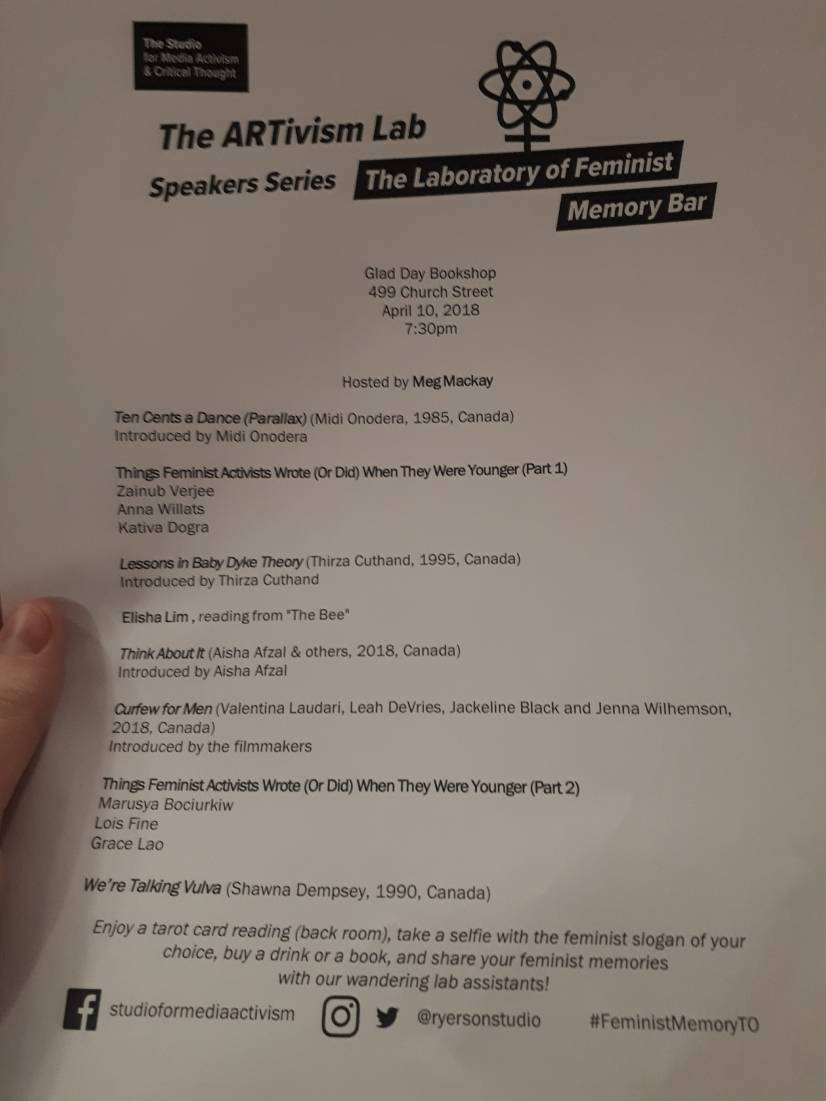Tonight was the final event of the ARTivism Lab Speakers Series, the Laboratory of Feminist Memory Bar. This was a fantastic and really fun event which I really enjoyed attending. The evening consisted of a variety of different and interesting presentations which took many forms such as songs, poetry readings and videos. What I think I enjoyed most about the evening was the diversity of expression. Even in simply the presenters who were under the banner of “Things Feminist Activists Wrote (Or Did) When They Were Younger”, each of them interpreted that concept very differently.

The evening had me thinking a lot about archives, and the way that an event like this is representative of good archival practice. In Steiner’s work she discusses “the process of archiving one’s own cultural history as a means to ‘heal and be empowered’” (4). Right from the start, I would definitely describe the evening as empowering. One of the moments that I remarked on was during the presentation of Curfew for Men there were many moments which had the entire audience laughing. Now, I don’t know if this is the kindest sentiment I have ever had, but I certainly can’t deny that I enjoyed sitting in a crowd of (almost) all women laughing together at men saying foolish things. There was something about the comradery and shared experience that I really enjoyed.
Steiner also discusses the way that “archiving non-traditional documents…presents a challenge to dominant discourses about which informational objects are valid for preservation” (11). This thought was particularly at play tonight, in the wide range of things that were exhibited. When I think of ‘archival documents’ I think of massive ledgers, maybe museum artefacts at a stretch. But these evening had so much more. From a novice video made by a 16-year-old in 1995, to a modern feminist’s social media feed, to a comedic music video about the vulva, each of these pieces could be so easily brushed off as unworthy of archival. But when they are exhibited in such a venue, they are given value and status.


In presenting each of these items in the form of a living archive, through the Laboratory of Feminist Memory, the importance of wide reaching and non-traditional archives can truly be seen. Especially when one realizes that the points made in We’re Talking Vulva are just as relevant today as when it was made.
Another element that stuck out to me, largely because of what my group did for our art project, was the power in comedy. We focused on satire specifically, and found multiple sources which indicated that satire connected with audiences so strongly because of the way it impacted their emotions (Lee & Jang, El Marzouki, da Silva & Garcia). I feel that in a similar way, the use of comedy throughout the evening helped make it more enjoyable, by bonding the audience, and making everyone happy and receptive to new ideas. I was a particular fan of Meg Mackay’s comedic bits and lighthearted hosting.
All in all, it was a fantastic and enjoyable night that was a great way to end an excellent class!
Works Cited
da Silva, Patrícia Dias, and José Luís Garcia. “YouTubers as satirists: Humour and remix in online video.” JeDEM – eJournal of eDemocracy & Open Government, vol. 4, no. 1, 2012, pp. 89-114.
El Marzouki, Mohamed. “Satire as counter-discourse: Dissent, cultural citizenship, and youth culture in Morocco.” International Communication Gazette, vol. 77, no. 3, 2015, pp. 282-296.
Lee, Hoon, and S. Mo Jang. “Talking About What Provokes Us: Political Satire, Emotions, and Interpersonal Talk.” American Politics Research, vol. 45, no. 1, 2017, pp. 128-154.
Steiner, Melissa. “Resisting digital archive fever: a critical investigation into the management of QTIPOC cultural heritage in the digital environment.” Unpublished Master’s Thesis, pp. 4-15.